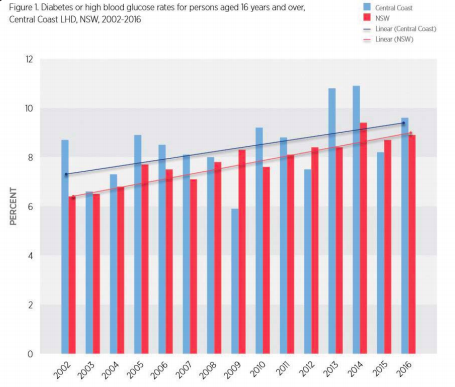A Wamberal resident is calling on the Central Coast Local Health District (CCLHD) to increase and improve upon the range of diabetes treatment and management services available to patients on the Central Coast.
Ms Kerrie Kristidis founded and runs the Central Coast Type 1 Community Facebook group, a not for profit page that shares information about diabetes research, medical equipment, treatment options, special events and services. The page also runs a range of information on juvenile diabetes. Ms Kristidis’ 7-year-old daughter, Alexis, has type 1 diabetes and said she and her daughter have experienced firsthand the difficulties in accessing some of the district’s diabetes services, including making appointments with the district’s only Paediatric Endocrinologist (PE). According to Ms Kristidis, the District currently employs one PE who works one day a week to see juvenile diabetics and a paediatrician who works two other days a week. Ms Kristidis said the short availability of the specialised PE was jeopardising the healthcare of juvenile diabetics in the region. “Generally, a Local Health District should supply one PE per 100 patients (children).
“That is what the national and international standard dictates,” Ms Kristidis said. “Our region’s PE sees at least 160 juvenile patients. “When I first began campaigning for the CCLHD to expand their PE service in 2017, they didn’t even have a PE, now they have one that works one day a week to treat children with type 1, it is not good enough. “In other hospitals, a child with standard type 1 diabetes can be seen by a PE up to four times a year. “Here on the Coast we are lucky to be seen by the specialist twice a year,” she continued. “The CCLHD has since filled the position as well as expanded the service, but they have employed a standard paediatrician to fill in the gaps, and this isn’t consistent with best practice care. “From my experience, both as a mother of a child with type 1 diabetes reliant on the CCLHD, and as an advocate for type 1 diabetes healthcare, the CCLHD needs to increase their service to properly support the region’s juvenile diabetics.
“Given the number of patients, it is inconceivable that the Central Coast does not have a full-time PE. “Their service is not at the level it needs to be to assist children and families on the Coast with their diabetes care. “By not properly resourcing and funding their outpatient services, they are pushing clients to the private sector, which is leaving families out of pocket, when already dealing with this costly disease. Coast Community News raised Ms Kristidis’ concerns with Dr Andrew Montague, CEO of the CCLHD. “The CCLHD provides a range of services for diabetes care on the Central Coast, including inpatient services, outpatient clinics and community programs to help support people with managing diabetes. “We have a multidisciplinary paediatric diabetes service with access to paediatric endocrinology, nursing, nutrition and social work services. “The paediatric diabetes service was recently enhanced to increase additional specialist support from one day to three days per week. “Support is provided by a paediatric endocrinologist one day per week, and a paediatrician with extensive experience in diabetes management, two days per week. “The District has also partnered with the Hunter New England Central Coast Primary Health Network and Yerin Aboriginal Health Service to develop a strategic plan for diabetes care on the Central Coast,” Dr Montague said.
Ms Krist Idis said: “Diabetes affects a number of organs when it is not managed well. “Food awareness is one of the key components to assist in reducing these illnesses,” Ms Kristidis continued. “There are currently around 30,000 diabetics on the Coast and this figure includes nearly 200 juveniles with type 1 diabetes. “The District has listed prevention as one of its key focus areas for the next four years, but have limited outpatient services. “Canberra Hospital holds cooking classes and food awareness classes for diabetics and their families. “It would be a simple matter of Dr Montague, investigating how this was done and implementing the same program here,” Ms Kristidis said. When asked about how the CCLHD provided care and treatment to diabetics, Dr Montague outlined the District’s approach and treatment/management programs. “People living with diabetes who are referred to the District are supported by a dedicated team of dieticians.
“Services include individual and multidisciplinary team consultation to ensure that nutrition advice and education provided is targeted towards the patient’s eating behaviours. “The District provides a carbohydrate counting and insulin adjustment program for both adults and children with type 1 diabetes. “These programs assist people with insulin adjustment, how to manage hypos, how to manage high blood glucose levels and how to adjust food and insulin for exercise. “At diagnosis, a multidisciplinary team will provide education and support to the patient and their family/ carer during their hospital stay. “This support continues the following discharge from the hospital through the District’s diabetes specialist outpatient clinic and individual consultations, email and phone advice and group programs,” Dr Montague said. Dr Montague also referred Coast Community News onto the Diabetes Care on the Central Coast 2017-2021 Plan in relation to the issue. “Trend lines from 2002-2016 show an overall increase in diabetes rates on the Central Coast and in NSW, with rates on the Central Coast higher than in NSW.”
Source: Interviews, Feb 28 Kerrie Kristidis, Wamberal Media Statement, Mar 13 Dr Andrew Montague, CCLHD Document, Mar 13 Diabetes Care on the Central Coast 2017-2021 Plan Dilon Luke, journalist



